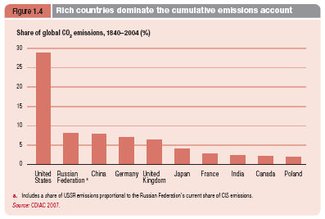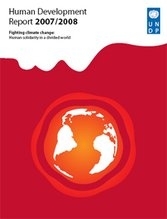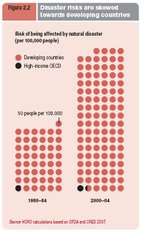UNDP Human Development Report 2007/2008
Contents
- 1 Introduction The United Nations Development Programme Human Development Report 2007/2008 was released on November 27, 2007. The report's title "Fighting climate change: Human solidarity in a divided world" reflects the consensus of its authors who conclude that the greatest threat to the future of human development lies in the potential consequences of oncoming climate change (UNDP Human Development Report 2007/2008) .
- 2 Findings
- 3 Further Reading
Introduction The United Nations Development Programme Human Development Report 2007/2008 was released on November 27, 2007. The report's title "Fighting climate change: Human solidarity in a divided world" reflects the consensus of its authors who conclude that the greatest threat to the future of human development lies in the potential consequences of oncoming climate change (UNDP Human Development Report 2007/2008) .
Findings
The Report documents that that climate change is not just a future scenario. Increased exposure to droughts, floods and storms is already destroying opportunity and reinforcing inequality. Meanwhile, there is now overwhelming scientific evidence that the world is moving towards the point at which irreversible ecological catastrophe becomes unavoidable. Business-as-usual climate change points in a clear direction: unprecedented reversal in human development in our lifetime, and acute risks for our children and their grandchildren.
 Share of global CO2 emissions, by country, 1840-2004. (Source: CDIAC 2007)
Share of global CO2 emissions, by country, 1840-2004. (Source: CDIAC 2007) The Report calls for alls for a “twin track” approach to dealing with climate change that combines stringent mitigation to limit 21st Century warming to less than 2°C (3.6°F), with strengthened international cooperation on adaptation. On mitigation, the authors call on developed countries to demonstrate leadership by cutting greenhouse gas emissions by at least 80% of 1990 levels by 2050. The report advocates a mix of carbon taxation, more stringent cap-and-trade programs, energy regulation, and international cooperation on financing for low-carbon technology transfer.
The report provides evidence of the mechanisms through with the ecological impacts of climate change will be transmitted to the poor. Focusing on the 2.6 billion people surviving on less than US$2 a day, the authors warn forces unleashed by global warming could stall and then reverse progress built up over generations.
Among the threats to human development identified in the report:
- The breakdown of agricultural systems as a result of increased exposure to drought, rising temperatures, and more erratic rainfall, leaving up to 600 million more people facing malnutrition.
- An additional 1.8 billion people facing water stress by 2080, including large areas of South Asia and northern China facing a grave ecological crisis as a result of glacial retreat and changed rainfall patterns.
- Displacement through flooding and tropical storm activity of up to 332 million people in coastal and low-lying areas.
- Emerging health risks, with an additional population of up to 400 million people facing the risk of malaria.
Citing recent research findings, the report authors argue that the potential human costs of climate change have been understated. They point out that climate shocks such as droughts, floods and storms, which will become more frequent and intense with climate change, are already among the most powerful drivers of poverty and inequality – and global warming will strengthen the impacts.
The Report concludes that there is a window of opportunity for avoiding the most damaging climate change impacts, but that the time frame is less than a decade to change course and to take actions that will have a profound bearing on the future course of human development.

